How To Become an RBT
Embarking on Your Journey Towards Certification in Behavior Analysis

Unlocking a Rewarding Career in Applied Behavior Analysis
Becoming a Registered Behavior Technician (RBT) is a rewarding pathway for individuals passionate about making a difference in the lives of those with developmental disabilities, including autism. This credential recognizes paraprofessionals equipped with the foundational skills necessary to support Board Certified Behavior Analysts (BCBAs) in delivering effective, ethical behavior-analytic services. This article offers a comprehensive, step-by-step guide on how to become an RBT, including eligibility criteria, training options, certification procedures, ongoing maintenance, and resources to support your journey.
Understanding the Purpose of the RBT Certification
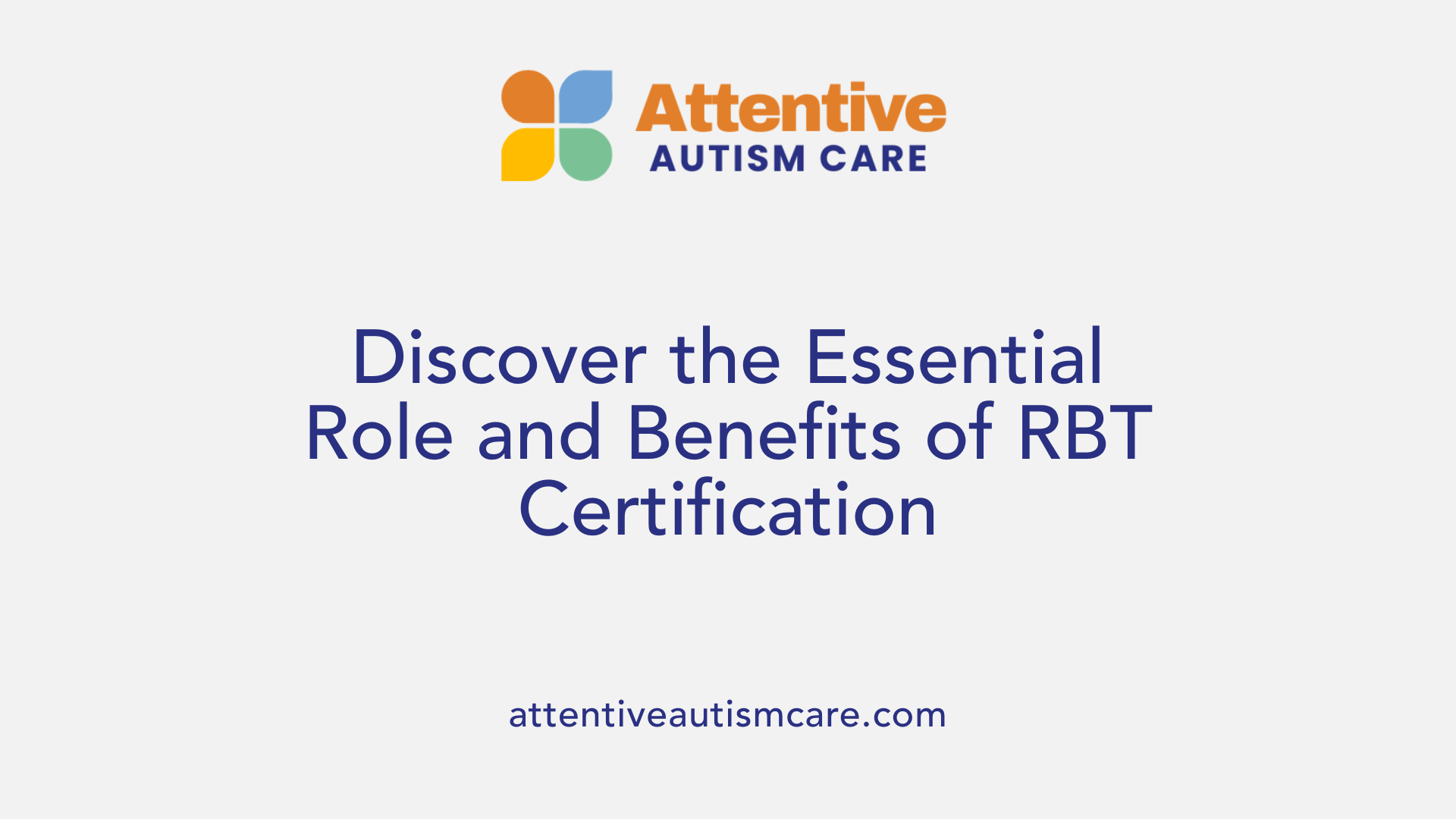 The Registered Behavior Technician (RBT) certification serves an important role in the field of applied behavior analysis (ABA). It is designed to officially recognize paraprofessionals who have acquired the necessary skills and knowledge to assist in delivering ABA services.
The Registered Behavior Technician (RBT) certification serves an important role in the field of applied behavior analysis (ABA). It is designed to officially recognize paraprofessionals who have acquired the necessary skills and knowledge to assist in delivering ABA services.
RBTs primarily work under the supervision of licensed professionals such as Board Certified Behavior Analysts (BCBAs). Their responsibilities include implementing behavior intervention plans, collecting data to monitor progress, and supporting individuals with autism and other developmental disabilities in developing important skills.
The certification process involves meeting specific eligibility requirements—such as being at least 18 years old, holding a high school diploma or equivalent, passing a background check, and completing a structured 40-hour training program aligned with the RBT Task List. After training, candidates must demonstrate their practical skills through a competency assessment and succeed in passing a comprehensive exam.
One of the main aims of the RBT credential is to standardize the role of paraprofessionals in ABA. This enhances professionalism and promotes high standards across the field. By ensuring that RBTs are properly trained and assessed, the certification helps ensure quality service delivery.
In addition, the RBT credential contributes to the credibility and career development of paraprofessionals. It fosters trust among clients, families, and professionals, emphasizing a commitment to ethical practice, professionalism, and client well-being.
Overall, the purpose of the RBT certification is to support effective, ethical, and consistent behavioral interventions, ultimately leading to better outcomes for individuals receiving ABA services.
Prerequisites and Eligibility for Aspiring RBTs
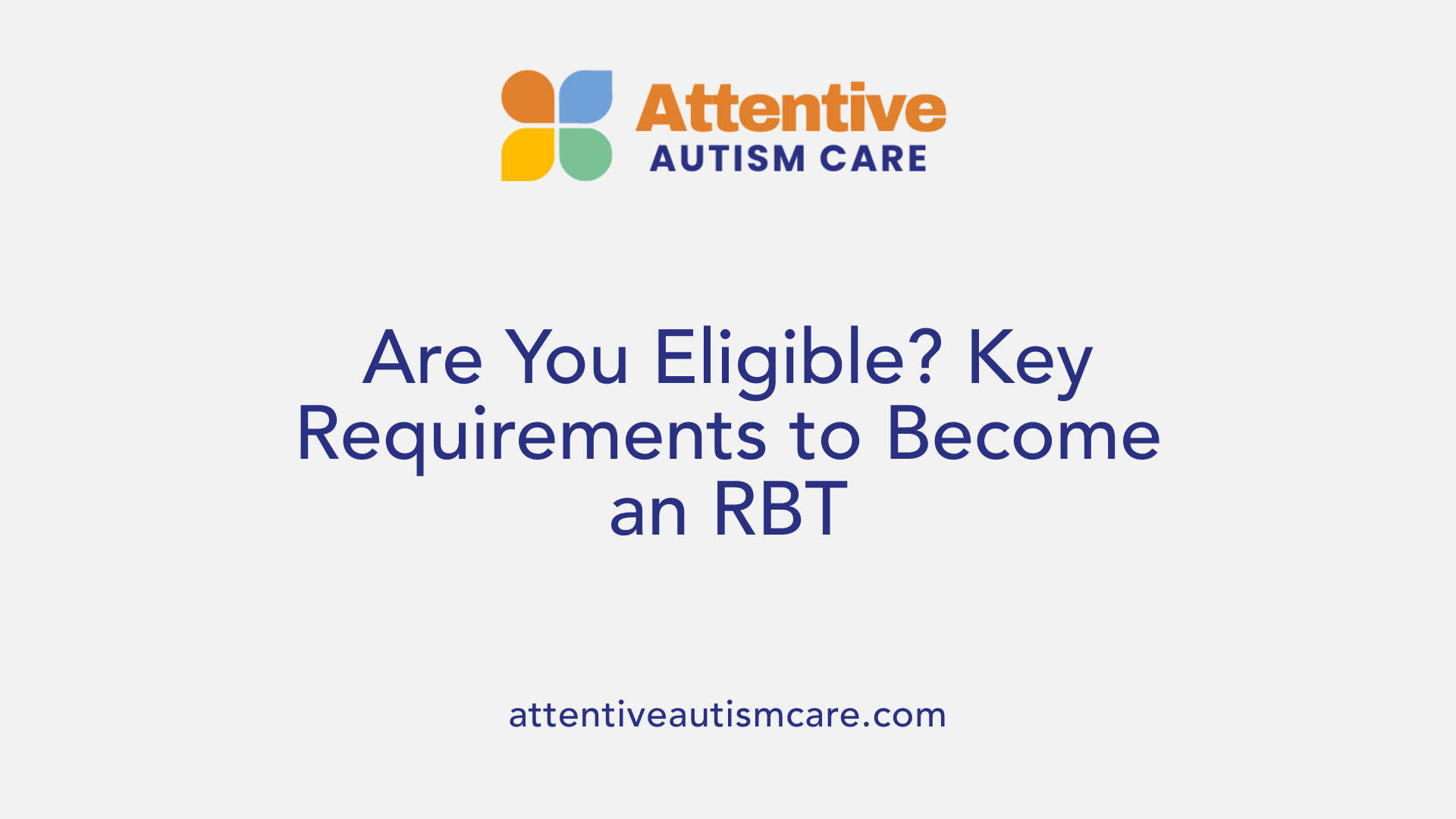
What are the general qualifications and eligibility requirements to become an RBT?
To become a Registered Behavior Technician (RBT), candidates must meet several basic eligibility criteria. First, they need to be at least 18 years old. This age requirement ensures that individuals have the maturity necessary to work responsibly in behavioral health settings.
Educationally, applicants must have completed high school or obtained an equivalent credential such as a GED. This minimum educational background ensures that candidates possess the foundational skills needed to understand and implement behavior-analytic procedures.
Beyond age and education, aspiring RBTs are required to pass a criminal background check and an abuse registry check. These checks are essential for protecting vulnerable populations and are conducted within 180 days prior to application submission through the Behavior Analyst Certification Board (BACB).
Completing the necessary coursework is also mandatory. Applicants must attend a 40-hour training program approved by the BACB. The training covers topics such as ABA fundamentals, ethics, data collection, and behavior strategies.
Once training is completed, candidates must demonstrate practical understanding and skills by passing an initial competency assessment conducted by a qualified supervisor, usually a BCBA or BCaBA.
The final step involves applying for certification through the BACB website. The application includes submitting documentation of training completion, exam registration, and background clearance. Candidates then need to pass the RBT certification exam, an 85-question multiple-choice test that evaluates knowledge of ABA principles, ethics, and practical skills.
Maintaining the credential requires ongoing supervision, adherence to ethical standards, and annual renewal with continued professional development and supervision hours. Following these steps ensures that RBTs are qualified, competent, and prepared to provide effective behavioral services.
Training and Education Pathways to RBT Certification
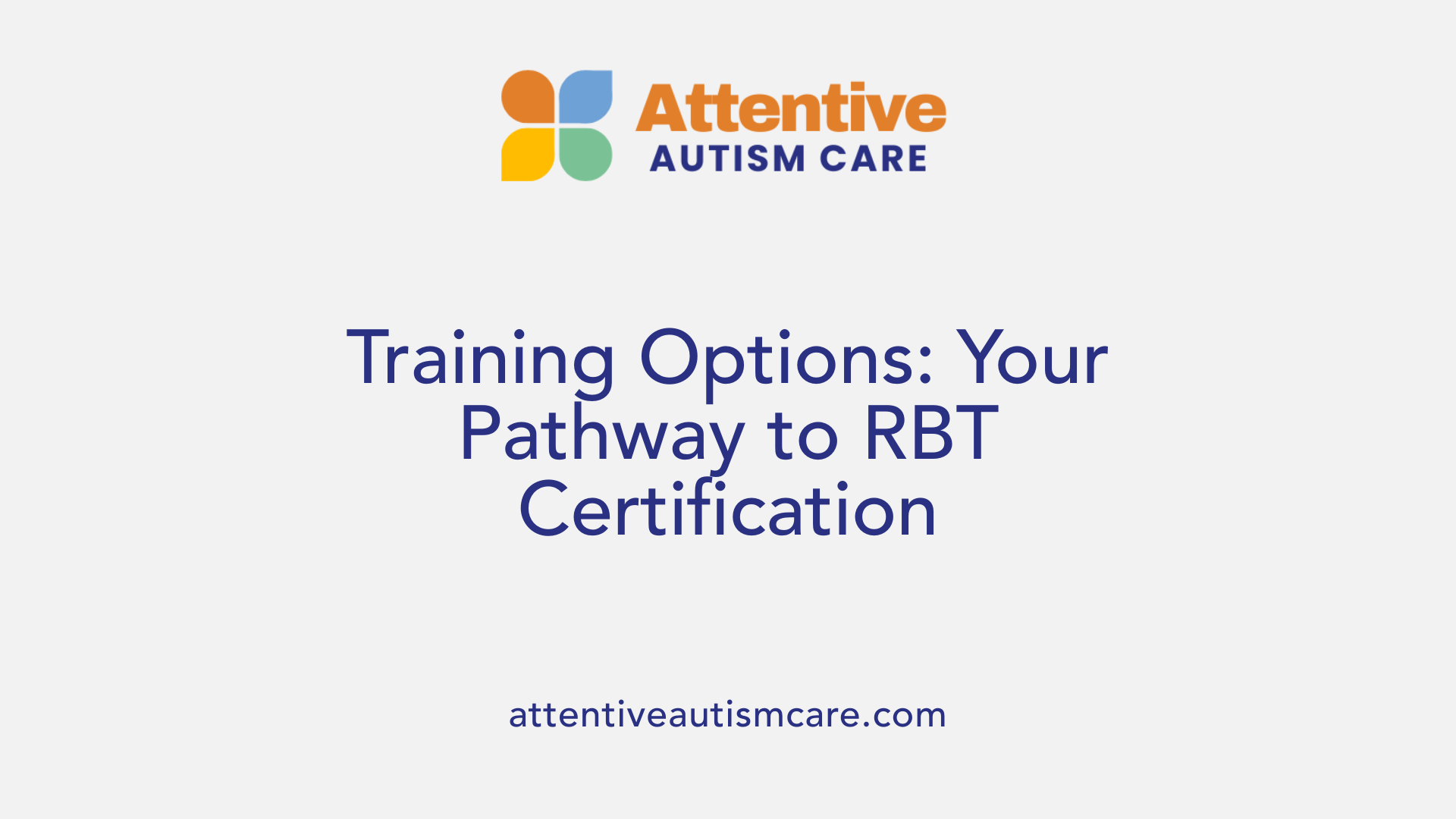
What are the training requirements and what options are available for RBTs?
To pursue certification as a Registered Behavior Technician (RBT), candidates must complete a comprehensive 40-hour training program. This training is based on the RBT Task List (2nd edition) and must be developed and overseen by a BACB-certified professional, such as a BCBA, BCaBA, or BCBA-D. The training ensures that all candidates acquire fundamental behavior analysis knowledge, including ethics, data collection, and intervention strategies.
The training can be delivered through various formats to accommodate different learning preferences. These include in-person classroom settings, online instructor-led courses, and experiential training methods. Regardless of the format, the program must fulfill specific requirements, such as covering crucial topics like ethics, supervision, assessment, and skill acquisition.
Responsible Trainers, who are qualified professionals, develop the content, conduct the training sessions, and keep records of attendance and completion. Upon finishing the course, participants receive a certificate of completion that details the content covered and their attendance.
In addition to the structured courses, many organizations and online platforms offer flexible training options. Some providers offer self-paced, online coursework that includes interactive modules, quizzes, and practice exams designed to prepare candidates for the BACB certification exam. These online programs often feature supplementary materials like study guides, practice apps, and additional certification resources.
The coursework must be completed within 180 days of starting and span a minimum of five days to ensure thorough understanding. Post-training, candidates are required to pass a competency assessment, which evaluates practical skills in addition to their exam performance.
In summary, aspiring RBTs have multiple accessible pathways to meet training requirements, including in-person and online options. These programs are designed to prepare individuals for the certification exam, practical skills, and professional responsibilities as an RBT. Completing the training, passing the exam, and fulfilling ongoing supervision conditions are vital steps to gaining and maintaining RBT certification.
The Certification Process and Exam Details
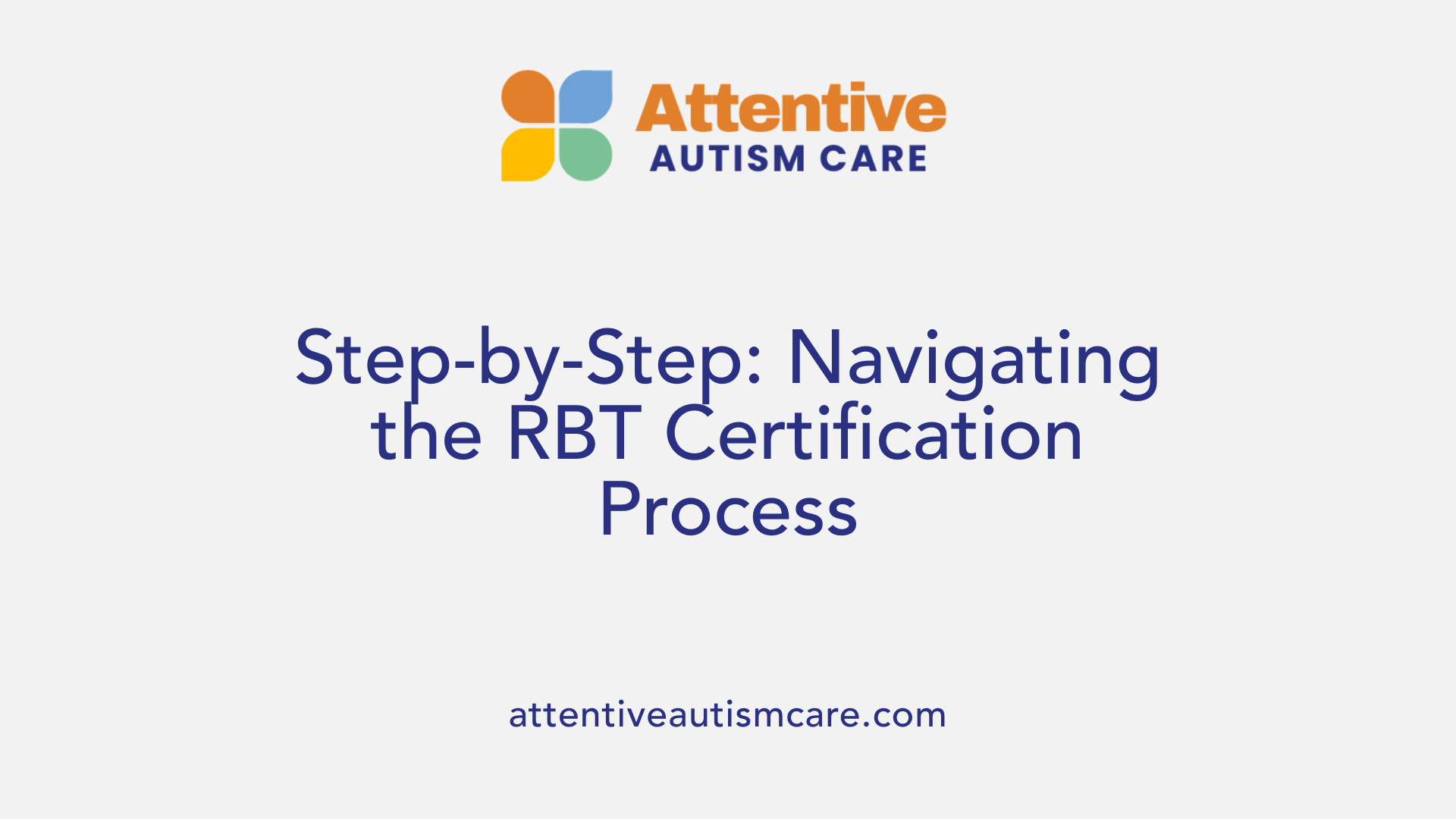
What does the certification process for the RBT include, and what are the exam details?
Becoming a Registered Behavior Technician (RBT) involves several steps regulated by the Behavior Analysis Certification Board (BACB). First, candidates must meet eligibility requirements, including being at least 18 years old, having a high school diploma or equivalent, passing a criminal background check, and completing a 40-hour training program approved by the BACB.
The training covers fundamentals of Applied Behavior Analysis (ABA), ethics, data collection, and behavior strategies. After completing the training, aspiring RBTs must demonstrate their practical skills through a competency assessment, which is conducted by a qualified supervisor like a BCBA.
Once these prerequisites are met, candidates apply to the BACB by submitting necessary documentation, such as proof of training and assessment completion. They also pay application fees, which are approximately $50, and exam fees, around $45. The application process involves creating a BACB account, submitting required documents, and scheduling the exam via Pearson VUE.
The RBT exam itself is a computer-based test consisting of 85 multiple-choice questions, with 10 unscored questions. Test-takers have 90 minutes to complete the exam, which covers topics from the RBT Task List (2nd ed.). These include assessment, skill acquisition, behavior reduction, documentation, and ethics.
The exam format is designed to evaluate candidates' understanding of ABA principles and ethical practices essential for effective client support. Candidates receive their results immediately after testing, and passing score requires attaining a scaled score of 300 or higher out of 350.
If a candidate does not pass on the first attempt, they can retake the exam up to 8 times within a year, with a minimum waiting period between attempts. Once certified, RBTs must continue their professional development and re-certify annually, which involves ongoing supervision, ethics adherence, and maintenance of competence.
In summary, the RBT certification process involves application, required coursework, competency demonstration, and passing a comprehensive exam. The entire process is designed to maintain high standards for professionals who assist in behavioral treatment under supervision.
| Step | Description | Cost | Additional Requirements |
|---|---|---|---|
| Application | Submit online application through BACB | $50 | Background check, training proof |
| Training | Complete 40-hour course from approved provider | Included in training fee | Relevant ABA content, ethics |
| Competency Assessment | Demonstrate practical skills via supervisor | No fee | Conducted within 90 days of application |
| Exam Scheduling | Register and schedule at Pearson VUE | $45 | Valid application approval |
| Certification | Pass the exam to become certified | Included in exam cost | Ongoing supervision for renewal |
This structured process, supported by BACB guidelines, ensures that RBTs are well-prepared professionals capable of supporting clients effectively in various settings.
Supervision and Certification Maintenance
What are the supervision and ongoing maintenance requirements for RBTs?
Registered Behavior Technicians (RBTs) are required to work under ongoing supervision from qualified behavior analysts, such as Board Certified Behavior Analysts (BCBAs) or BCBA-Doctoral (BCBA-D). This supervision is essential for ensuring that services are delivered effectively and ethically.
Supervision sessions occur at least twice per month, with at least one being a face-to-face, individual meeting. During these sessions, supervisors observe the RBT’s service delivery directly, providing real-time feedback and coaching on behavioral strategies and data collection.
In addition, supervision must encompass case conceptualization, behavior skills training, and performance review to ensure continuous improvement and adherence to ethical standards.
The BACB requires that supervision covers at least 5% of the total service hours provided by the RBT each month. Of this, at least 2.5% must be direct, in-person supervision.
Both the RBT and their supervisor are responsible for maintaining detailed records of supervision activities. These records should be kept for a minimum of seven years and include documentation of supervision hours, topics discussed, and progress made.
Supervisors must have completed appropriate training, including an 8-hour supervision course, to provide effective oversight.
What is involved in ongoing professional development for RBTs?
Maintaining certification also involves ongoing professional development. RBTs are required to complete continuing education units (CEUs) and participate in professional growth activities regularly.
This ongoing learning helps RBTs stay current with advances in ABA techniques, ethical practices, and relevant regulations. It also includes renewing their certification annually by fulfilling the BACB’s renewal requirements.
During renewal, RBTs must demonstrate continued supervision compliance, complete a renewal competency assessment, and adhere to the BACB code of ethics. Payment of renewal fees is also necessary to keep certification active.
How does the renewal process work?
The renewal process involves submitting renewal documentation annually through the BACB portal. RBTs need to verify that they have met supervision requirements and completed the required professional development activities.
Supervision during renewal must include at least two face-to-face contacts per month, with at least one being a private, individual supervision session.
Failure to meet renewal criteria results in inactive certification, preventing the RBT from practicing or representing themselves as active.
During inactive status, RBTs can choose to reactivate their certification by fulfilling past due supervision and CEU requirements.
Continual adherence to the BACB’s ethical guidelines, alongside ongoing education, ensures that RBTs provide high-quality, ethical behavioral services to their clients.
Resources; Support; and Continuing Education
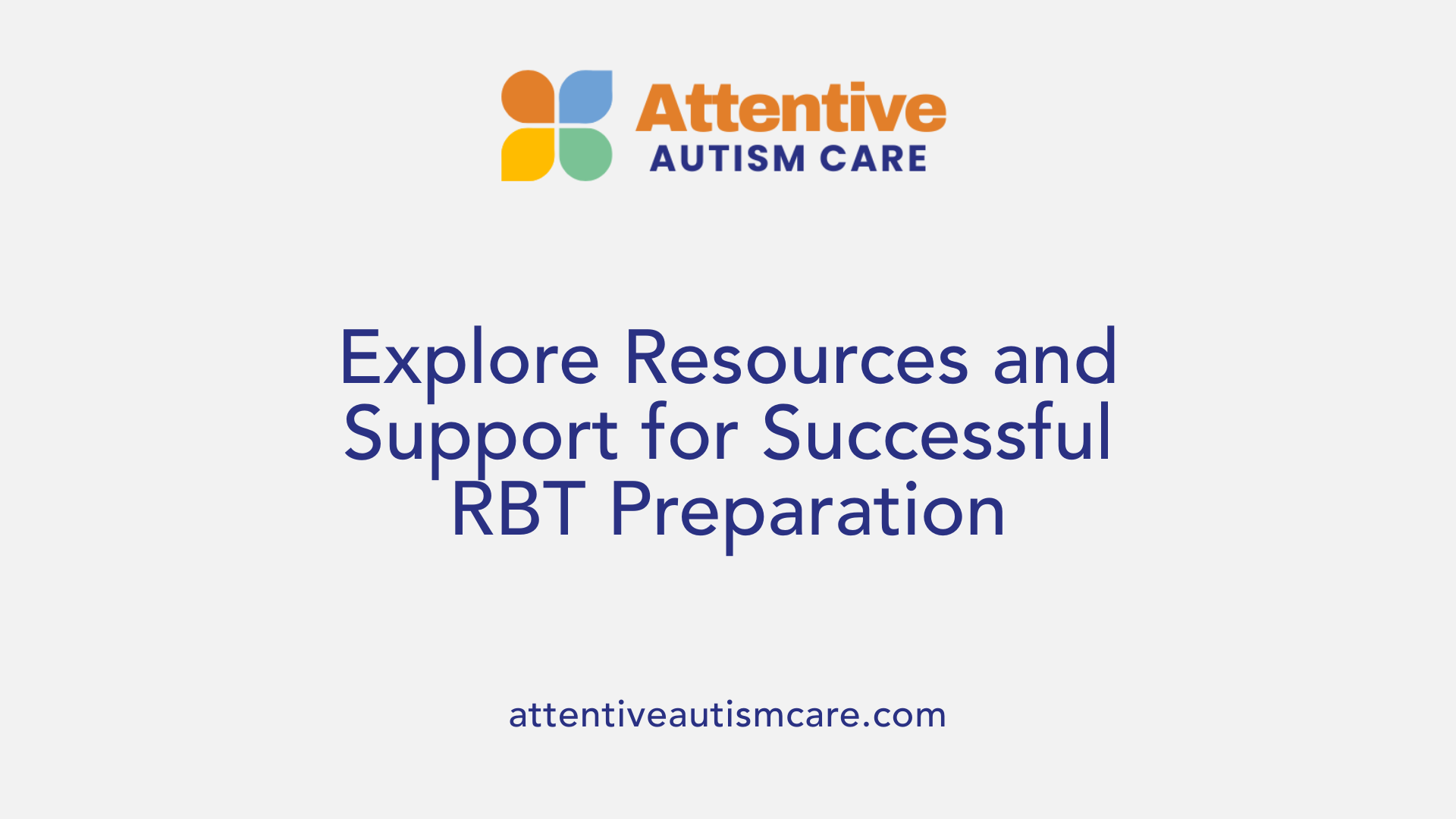
What resources and support are available for individuals pursuing RBT certification?
Individuals working towards becoming Registered Behavior Technicians (RBTs) have access to a variety of valuable resources and support systems designed to aid their preparation and professional development.
One of the primary resources is the completion of BACB-approved 40-hour training programs. These courses offer detailed instruction on core ABA principles, ethics, data collection methods, and behavior strategies. Many programs include interactive components, real-time instructor feedback, and practical exercises to reinforce learning.
The Behavior Analyst Certification Board (BACB) also provides official materials such as the RBT Handbook, training packets, and detailed examination guidelines. These documents serve as essential study aids, outlining responsibilities, procedures, and content areas covered in the certification process.
Support from qualified professionals is crucial. Supervision by Board-Certified Behavior Analysts (BCBAs) offers mentorship, feedback, and skills assessment. Supervision supports include scheduled meetings, direct coaching, and review of work samples, which help refine practical skills and ensure compliance with ethical standards.
Moreover, the BACB's website is a comprehensive resource that guides candidates through the application process, exam scheduling, renewal procedures, and policy updates. It features step-by-step instructions, FAQs, and links to additional learning tools.
Various online platforms also offer study aids, such as practice exams, flashcards, and mobile apps, to prepare for the certification exam. These aids help reinforce knowledge and improve test-taking confidence.
Professional development opportunities extend beyond initial certification. Continued education through webinars, CEU courses, and workshops allows RBTs to stay current with evolving practices and maintain their certification status.
Overall, a broad network of instructional, informational, and supervisory resources supports aspiring RBTs throughout their career journey, ensuring they are well-equipped to deliver quality behavioral services.
Educational and Career Pathways for Aspiring RBTs
Does a college degree qualify me to become an RBT?
No, a college degree is not required to become a Registered Behavior Technician (RBT). The main prerequisites focus on age, education level, and specific training. Applicants must be at least 18 years old and have completed a high school diploma or its equivalent.
The process involves completing a 40-hour ABA training program approved by the Behavior Analyst Certification Board (BACB). This training covers essential aspects like ABA fundamentals, ethics, data collection, and behavior strategies. Many courses are available online, including those designed to meet BACB guidelines, often allowing for flexible, self-paced learning.
After completing the training, candidates must pass a competency assessment conducted by a qualified supervisor, such as a BCBA. Once the assessment is successfully completed, aspiring RBTs must pass a certification exam with 85 multiple-choice questions.
Having a college degree, especially in related fields like psychology, education, or social work, may offer some advantages in understanding behavior analysis concepts. However, it is not a requirement for certification or starting work as an RBT. The role is accessible through focused training and certification, making it an achievable career entry point for many interested in the behavioral health field.
The simplified entry process emphasizes practical skills and supervised experience rather than formal higher education, broadening opportunities for individuals seeking a career in ABA therapy.
Career opportunities in ABA
Becoming an RBT opens the door to various career paths within the field of Applied Behavior Analysis (ABA). RBTs typically work under the supervision of a Board Certified Behavior Analyst (BCBA) or a behavior analyst at the BCaBA level.
Career options include working in schools, clinics, hospitals, and home-based therapy settings. RBTs often assist in implementing treatment plans, collecting data, and supporting clients with developmental disabilities, such as autism spectrum disorder.
With experience, some RBTs choose to pursue further education or certification to become BCBAs or BCaBAs, which involve advanced coursework and significantly increased responsibilities.
| Career Path | Requirements | Typical Work Environments | Growth Opportunities |
|---|---|---|---|
| RBT | 40-hour training, competency, exam | Schools, clinics, homes | Entry-level, direct client support |
| Behavior Technician | Similar to RBT, depends on region | Similar to RBT | Entry into ABA field |
| BCBA (Board Certified Behavior Analyst) | Graduate-level degree, supervised hours, certification | Private practices, clinics, educational institutions | Advanced roles, supervision, program design |
| BCaBA (Board Certified Assistant Behavior Analyst) | Undergraduate degree, supervised hours, exam | Similar to BCBA but with less scope | Leadership and consultancy roles |
Overview of pathways to advance in ABA
Starting as an RBT provides foundational experience and an understanding of behavioral interventions. Many professionals progress to become BCBAs by earning a master's degree in behavior analysis or related fields, completing supervised hours, and obtaining certification.
In summary, aspiring RBTs do not need a college degree to enter the field but can benefit from further education to expand their career opportunities. The pathway involves targeted training, supervised practical experience, and certification, enabling a flexible entry into a rewarding and growing area of healthcare and education.
Salary Expectations and Job Outlook for RBTs
What is the typical salary range for RBTs?
The earning potential for Registered Behavior Technicians (RBTs) can vary widely based on factors like location, experience, and workplace setting. In Florida, for example, salaries usually span from $43,000 to $64,000 annually. The median salary in the state hovers around $54,000 per year, with a base pay range roughly between $41,000 and $56,000. Additionally, many RBTs receive extra compensation between $2,000 and $5,000.
Nationally, the average salary for an RBT is approximately $53,693 annually. Entry-level salaries often start closer to $37,000, which translates to about $18 to $20 per hour. More experienced RBTs, especially those with specialized skills or working in high-demand areas, can earn closer to $119,000 per year. Overall, salaries tend to increase with experience, specialization, and geographic location.
How do geographic variations influence salaries?
Location plays a significant role in salary differences for RBTs. For instance, urban centers or regions with higher living costs, like parts of California and New York, tend to offer higher wages. Conversely, salaries in rural areas or regions with lower living costs may be closer to the national average or slightly below.
States with a greater demand for behavior analysts and paraprofessionals often see more competitive compensation packages. This variation underscores the importance of considering local job markets when planning a career as an RBT.
What are the career growth opportunities?
While the RBT role in itself is a paraprofessional position, it serves as a foundational step toward more advanced careers in behavior analysis. With experience, RBTs can pursue further certifications such as becoming a Board Certified Behavior Analyst (BCBA) or a BCaBA.
These advanced roles often come with greater responsibilities, higher salaries, and broader job opportunities in clinical settings, schools, or research. Additionally, many employers value experienced RBTs highly and may offer opportunities for professional development, specialization in areas like autism treatment, or leadership roles.
| Aspect | Details | Additional Notes |
|---|---|---|
| Typical salary range | $37,000 – $119,000+ | Varies by experience and location |
| Geographical impact | Higher in urban, high-cost areas | Lower in rural or low-cost regions |
| Career advancement | Path to BCBA, BCaBA, or specialization | Opportunities for training, supervision, and leadership |
| Job growth outlook | Positive, with increasing demand for ABA services | Growing focus on autism and behavioral health |
Pursuing a career as an RBT offers promising financial and professional growth avenues, especially for those committed to advancing in the field of applied behavior analysis.
Start Your Path to Making a Difference Today
Embarking on a career as an RBT is a meaningful way to contribute to the well-being and development of individuals with behavioral needs. By meeting the eligibility requirements, completing the required training, passing the certification exam, and committing to ongoing supervision and professional development, aspiring individuals can enter this growing field. With increasing demand for qualified behavior technicians nationwide, this pathway not only offers fulfilling work but also promising career growth and competitive salaries. Start your journey today and join a community dedicated to improving lives through applied behavior analysis.
References
- Registered Behavior Technician (RBT) - BACB
- How to Become a Registered Behavior Technician (RBT)
- 40 Hour RBT® Online Training: RBT 40 Hour Course
- How to become a registered behavior technician? - Career Village
- How to Become a Registered Behavior Technician (RBT) in Texas
- [PDF] registered behavior technician® handbook | bacb
- Registered Behavior Technician (RBT) Training




































































































